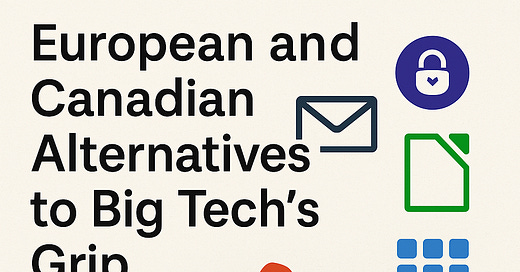Ditching Google, Microsoft, and Zoom for Privacy-First Alternatives in Europe and Canada
Or How To Escape the Surveillance States
Wrapped in slick UIs and “free” pricing models, American tech giants like Google, Microsoft, and Zoom have embedded themselves into our businesses, schools, governments, and personal lives. But that convenience comes with serious strings attached: US jurisdiction, surveillance mandates, and a sprawling network of data siphoning that would make Orwell raise an eyebrow.
It’s time to decolonise your digital stack. Because if your communication tools are built on American infrastructure, your data is essentially renting space in a surveillance state.
The Not-So-Invisible Hand: Enter the US CLOUD Act
Let’s address the elephant in the server room: the US CLOUD Act.
your data is essentially renting space in a surveillance state.
This charming little piece of legislation forces American companies to hand over data—even if it’s stored outside the US—when Uncle Sam comes knocking. Yes, even if your business is in Europe, your data lives in Frankfurt, and you’ve done everything “right” on paper, a US court order can still demand access.
And Google? Microsoft? Zoom? They don’t just fall under this law—they are this law’s primary targets.
The EU’s GDPR and Canada’s PIPEDA were built to protect privacy. The CLOUD Act was built to undermine it.
How Your Domain Extension Could Put Your Data at Risk
When organisations think about cybersecurity and data sovereignty, they often focus on encryption, hosting locations, and compliance with laws such as GDPR and PIPEDA. However, an often-overlooked risk comes from something as simple as your domain extension
The Sovereign Tech Rebellion: Why Europe and Canada Matter
Digital sovereignty isn’t a buzzword, it’s your firewall between sensitive data and prying eyes. Choosing platforms based in Europe or Canada means your data lives under stronger privacy laws, more ethical frameworks, and far less likelihood of backroom deals with the NSA.
The EU’s GDPR and Canada’s PIPEDA were built to protect privacy. The CLOUD Act was built to undermine it.
Here’s how to start the switch.
Email: Burn the Gmail Habit
Tuta (Germany)
Fully encrypted, ad-free, and zero US servers. Fiercely independent—no Google tracking, ever.Proton Mail (Switzerland)
End-to-end encrypted, open-source, and protected by ironclad Swiss privacy laws. Includes calendar, VPN, and drive.Mailfence (Belgium)
Built-in OpenPGP, digital signatures, and no surveillance capitalism. A solid alternative for professionals.
Meetings & Collaboration: No More Zoom
Whereby (Norway)
Browser-based, GDPR-compliant, no storage without permission. Meetings with zero bloat.Jitsi (Open-source)
Encrypted, self-hostable, or use their EU servers. Lightweight and privacy-hardened.Nextcloud Talk (Germany)
Secure video, chat, and file-sharing in a self-hosted or EU-hosted setup. Your data, your rules.
Office Suites: No More Word Crimes
LibreOffice
Open-source, developed with global (and EU) backing. Full-featured, offline, and no telemetry.ONLYOFFICE (Latvia)
Real-time co-editing, collaborative tools, cloud or on-prem deployment. No data scraping.CryptPad (France)
Think Google Docs—but zero knowledge. Even the devs can’t see your stuff.
Messaging & File Sharing
Element / Matrix Protocol (UK/EU)
Decentralised, encrypted, and enterprise-ready. Federated control for secure messaging.Threema (Switzerland)
No phone number needed. Anonymised and encrypted. Like Signal with less compromise.Tresorit (Switzerland)
Encrypted file storage and collaboration built for compliance-heavy environments.
Canadian Contenders
[Webnames.ca / Fastmail.ca]
Email providers with Canadian data residency. Built for legal compliance and peace of mind.Kopano (Canada/EU)
Email and groupware. Open-source, privacy-by-design, and an Outlook alternative that won’t sell you out.OpenMedia
A non-profit helping individuals and organisations navigate the privacy-first internet. Policy advocacy + practical tools.
This Is Planning, Not Paranoia.
You don’t have to delete your Google account today or smash your Office 365 subscription with a hammer (tempting though that is). But every step away from centralised, surveillance-happy platforms is a step toward sovereignty, security, and sanity.
Start migrating. Run pilots. Move your comms and docs to platforms that don’t have a data-sharing agreement with five intelligence agencies and two alphabet-soup government departments.
A Final Word (and a Plug)
At PrivID, we build tech with the same philosophy: encrypted, privacy-first, and beyond the reach of surveillance-hungry regimes. Using ZKP and FHE, we show organisations how to take back control of their identity infrastructure without ever sacrificing usability.
If your tech stack doesn’t respect privacy by design—it’s time for a change.
TL;DR:
If your business runs on Google, Zoom, or Microsoft, you’re not just renting tech—you’re handing over control.
There’s a better way. It starts in Europe and Canada.
Time to break up with Big Tech—and keep your privacy intact while you're at it.
Like this post? Share it with a friend who's still living in Google Drive. They'll thank you later.






